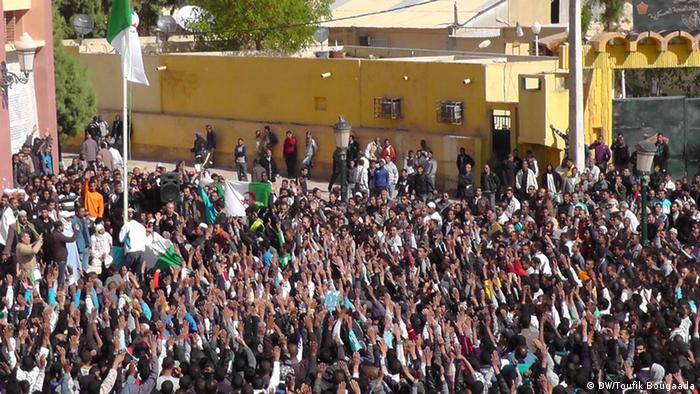In the Maghreb countries, more and more well-Educated on the way to Europe. As a result, the economic development in the countries of origin is increasingly deteriorating. Now the Trend is to be stopped.

Right to work: a Demonstration of young Tunisians in Tunis, January 2016
The Figures are alarming. Each year over 600 Moroccan engineers left their homeland, announced in the summer of 2018, Said Amzazi, Minister of the interior of the North African Kingdom, is a huge professional phlebotomy, is added to the infrastructural modernisation of the country. The engineers are only part of a much wider Brain Drain, to fight with the country: Every year, approximately 8000 computer scientists returned to the country, the President of the Moroccan Association for information technology, Salwa Belkeziz-Karkari. This was not least due to the rain the recruitment policies of French businessmen visited the country regularly, so Belkeziz-Karkari, according to the digital newspaper “Morroco World News”.
Especially in recent years, the development had come to a head once again, says Fatima Ait Madani, Migration sociologist at the Institute for African studies in Rabat. “The last three-year courses of the engineering College are fully migrated – a total of 750 engineers.
In addition, a further new tendency to do in recent years: “It’s just students or new graduates from Hiking, but also already well-established work forces. Even though you are working already in Morocco, but seek a better quality of life in Europe, especially for better educational opportunities for their children,” said Madani in a DW Interview.

Under pressure: the Moroccan health system, a hospital in Nador
Algerian Doctors in Europe and the Gulf
It looks similar in other Maghreb countries. In Tunisia, around 10,000 engineers, have left since 2011, the country. Acuminate, the Situation, particularly since the year 2015, as many Tunisians hope for economic improvement in the country tasks. Since then, a total of 69,000 Tunisians were left to search for work elsewhere, Lorena Llando, head of the office of the International organization for Migration (IOM) in Tunis, according to the news Agency epd. This corresponds to approximately 1.7 per cent of the active population.
In Algeria, the issue of academic loss qua emigration is now even a topic in the election campaign scheduled for April presidential elections. In France alone, around 15,000 Algerian Doctors working currently 4000 more have submitted applications to the country for foreseeable leave. The reasons for professional phlebotomy would be on the Hand, Mohamed Yousfi, President of the Algerian Association of Public health work Doctors (SNPSSP). “The salaries and working conditions are bad,” Yousfi told the Reuters news Agency. “The Algerian doctors to fill the medical desert in the Western countries such as France, Canada and Germany. Also in the Gulf States, they are present,” said Yousfi.
Stagnant Health System
Although Algeria has a wide range of state health system in which more than 50,000 Doctors and 150,000 beds are available. But this state-operated System there is no private competition. The result is that The System is outdated and inefficient. After his visit in the spring of 2016, the special Rapporteur of the Commission on human rights of the United Nations, Dainius runner-up of the country agreed, although continuous progress in the Development of the health service since independence in 1992. He observed but also “a lack of good management and lack of incentives to care for the individual sectors of the health care system appropriately.”

A constant frustration: a Demonstration against high unemployment in Algiers, 2011
The dissatisfaction with the working conditions as well as the reward that is driving more and more well-educated people out of the country. Overall, an OECD working study found that in 2010, about five million well-educated people – the equivalent of about 20 percent of the graduates from the three Maghreb countries abroad. For comparison: in 1990 there were ten per cent. The highest rate of increase was recorded in Algeria: There, the number of working abroad academics had quadrupled in the same period.
The ongoing Exodus has also been the state oil and gas company Sonatrach, one of the economically most important companies in the country. In the past eight years, you’ve lost the 16,000 well-trained employees, the company announced in August of last year, in a press statement.
Long ago, the constant migration has resulted in a vicious circle: Young talents, do not wander off, because you can find the home with the conditions that you can imagine. By continuing you don’t contribute, but that is a change in circumstances in the old country, but on the contrary, may deteriorate further. The result: even more people migrate.

Chronic the Algerian petroleum industry:
The “Marshal plan” for Africa
How can the Brain Drain be stopped? The Federal Ministry for economic cooperation and development (BMZ) has given in his “Marshal plan for Africa” answers. This includes first of all economic aid. So for example, the young founder of the company, are supported. This does not happen, however, by a simple money transfer. Instead, the BMZ, is working with partners – such as banks – on-the-spot tailored developed financial services, like loans, local currency loans and hedging risks. These young companies can use founder. In addition, the BMZ makes for a reliable energy supply: industrial companies depend on mandatory. With a view to exporting to Europe an infrastructure for quality assurance should be built so that the produced Goods, the European import requirements.
However, the promotion is not limited to immediate economic factors. Investments in security, peace and stability should also contribute to a favourable development of the labour market, as well as investments in a democratic, rule of law and Human rights Standards. Transparency and the fight against corruption are considered to be prerequisite to maintain the highly educated work forces in the country, where they are urgently needed.